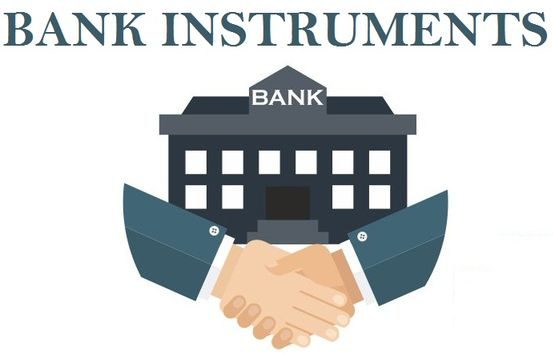What Are Bank Instruments?
goldandlandsadmin October 17, 2022 No Comments

Bank or financial instruments are contracts for monetary assets between individuals/parties that can be purchased, traded, created, modified, or settled for.
They can be either physical or digital in form and include currencies, bonds, stocks and bonds, futures, and options. The Association of Chartered Certified Accountants defines financial instruments as “Any contract that gives rise to a financial asset of one entity and a financial liability or equity instrument of another entity.”
Types Of Financial Instruments?
1. Cash instruments
These are instruments that have their own market value, therefore the value is determined directly by the markets. Cash instruments can be classified into two categories: securities and deposits & loans.
• Securities:
The two main types of cash instruments used in finance are stocks and loans. These financial instruments are traded on the stock market, wherein a security purchase signifies ownership of a slice of the publicly-traded company.
• Deposits and loans
These are financial instruments—such as stocks, bonds, loan agreements, and certificates of deposit—representing some type of contractual agreement between the parties involved.Common cash instruments are stocks, bonds, loan agreements, securities, and certificates of deposit.
2. Derivatives
Derivative instruments are financial contracts whose value is based on the price of an underlying entity, such as a stock or commodity. The value of a stock option changes in line with the price of the underlying stock. Stock options, commodity futures, and interest rate swaps are examples of derivatives. Derivatives also have terms that impact their value.
They can be exchange-traded derivatives and over-the-counter (OTC) derivatives. The derivatives can be broadly classified as forwards, futures, and options.
• Forward:
A forward contract is a contractual obligation between two parties in a derivative transaction in which the exchange of the underlying takes place at a particular price at the end of the contract.
• Future:
It is a derivative transaction that facilitates the exchange of the underlying on a pre-decided future date at a predetermined exchange rate.
• Option:
It is an agreement in which the buyer of the option enjoys the right to exercise the option of either purchasing or selling the underlying at a predetermined price within a particular period of time.
3. Foreign Exchange Instruments
The foreign currency exchange market is a specialized financial market that deals primarily in currency agreements. These can be further broken down into three categories:
Financial Assets vs Financial Liability
1. An invoice is written by company A to business B means a future cash flow to the company A that issued it, and a liability to business B that receives it.
2. Likewise, a loan made by company A is a future cash flow when the borrower pays back and a liability to the borrower.
3. Mr. A writes a check to the utility company as a financial instrument.
4. A mortgage agreement is a financial instrument.
Ways To Buy Financial Instruments?
There are several ways to acquire these financial instruments, and the following list represents a few of them:
• Brokers
• Issuing company
• Banks
• Individual investors
It is important to know that there are lots of risks involved in buying financial instruments so it’s advisable to buy from a reliable source and look out for potential risks before investing in them.
Uses of Financial Instruments?
Financial instruments are used for various purposes such as;
• Payments:
Financial instruments are used as means of payment on a day-to-day basis for services rendered to us or goods bought. Doctor bills, car purchases, mortgages, apartment leases, and many more financial instruments are used for payment.
All financial instruments represent a contract with the right to a future cash flow, a liability, and include terms and conditions. It can be in the form of credit cards, invoices, Chequers, drafts, digital currencies, stocks, and many more.
• Raising Capital
Governments and businesses use financial instruments to raise capital. Companies issue stocks and bonds, which are sold to investors in exchange for rights to ownership, interest payments, and a promise to repay the principal or original amount invested. Federal, state, and local governments issue financial instruments in the form of securities for bonds to fund projects.
Also Check: Bank Instruments: BEC, BF, BG With Pre-advise For Receivers
• Storing Value
Financial instruments can serve as investments, they have value and can be bought and sold. Receivables represented by outstanding invoices can be sold to “factoring” companies, which then collect amounts owed.
In order to collect on delinquent credit card debts and other consumer debts, firms that specialize in that area are often contracted with by banks. Also, companies that trade stocks, bonds, or other securities can be contracted to do so on exchanges.
• Transferring Risk
Investors purchase financial instruments like stock options and interest-rate swaps to protect against losses. International companies buy currency futures to offset the risk of changes in exchange rates. Each of these contracts exchanges a right to buy something, sell something, or receive cash flow in the future, in exchange for payment according to terms and conditions.
• Speculation
Investors purchase options contracts—which give the right, but not the obligation, to buy or sell stocks, currency and commodities such as gold within a set period of time in the future—because they expect the price of an underlying asset to increase.
Conclusion
Financial instruments are contract agreements between parties that capture the monetary value of the underlying asset. Each type of financial instrument has certain benefits along with some potential risks. Hence, it is important to know the ins and outs of the instruments before buying them.